Hara-Kiri: Death of a Samurai Blu-ray Movie
HomeHara-Kiri: Death of a Samurai Blu-ray Movie 
一命 / IchimeiCinedigm | 2011 | 128 min | Not rated | Jan 22, 2013
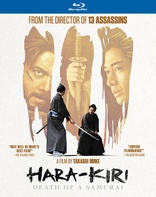
Movie rating
7.4 | / 10 |
Blu-ray rating
| Users | 3.0 | |
| Reviewer | 4.0 | |
| Overall | 3.9 |
Overview
Hara-Kiri: Death of a Samurai (2011)
An tale of revenge, honor and disgrace, centering on a poverty-stricken samurai who discovers the fate of his ronin son-in-law, setting in motion a tense showdown of vengeance against the house of a feudal lord.
Starring: Koji Yakusho, Hikari Mitsushima, Naoto Takenaka, Eita Nagayama, Ebizô IchikawaDirector: Takashi Miike
| Foreign | Uncertain |
| Drama | Uncertain |
| Period | Uncertain |
Specifications
Video
Video codec: MPEG-4 AVC
Video resolution: 1080p
Aspect ratio: 2.39:1
Original aspect ratio: 2.39:1
Audio
Japanese: DTS-HD Master Audio 5.1
Japanese: DTS-HD Master Audio 2.0
Subtitles
English
Discs
25GB Blu-ray Disc
Single disc (1 BD)
Packaging
Slipcover in original pressing
Playback
Region A (B, C untested)
Review
Rating summary
| Movie | 4.0 | |
| Video | 4.5 | |
| Audio | 4.5 | |
| Extras | 0.5 | |
| Overall | 4.0 |
Hara-Kiri: Death of a Samurai Blu-ray Movie Review
Miike remakes Kobayashi and the results are surprisingly excellent.
Reviewed by Jeffrey Kauffman January 21, 2013A lot of complaints can be (and have been) lobbed toward Japanese filmmaker Takashi Miike, but few would ever accuse the prolific auteur of lacking range. Some of Miike’s work has been intentionally provocative, with such films as Ichi the Killer, 13 Assassins and Audition causing international outrage for their unflinching depictions of violence and (some would allege) perversity. But snuggled up against these controversial outings are weird and wacky fare like Zebraman 2: Attack on Zebra City and the completely outré The Happiness of the Katakuris. These five films are only the tip of a very large and disparate iceberg, but they give at least some indication of the fact that Miike is a filmmaker seemingly obsessed with not being pigeonholed. Hara-Kiri: The Death of a Samurai is far from Miike’s most violent piece, and while it is nowhere near as intense as 13 Assassins, might be compared to that film if for no other reason than both outings are remakes of earlier films and both seek to reinvent the mythos of the samurai. Miike’s samurai films often have probably intentional stylistic and thematic links to American Westerns, and if 13 Assassins might be thought of as Miike’s “Peckinpah” film, Hara-Kiri: The Death of a Samurai might be more aptly compared to Anthony Mann, for the film relies less on outright action than it does on slow and deliberate exposition and character development. (Miike fans will already know that he actually did do his own version of a "traditional" western with Sukiyaki Western Django, which of course under Miike's hand was far from traditional.)
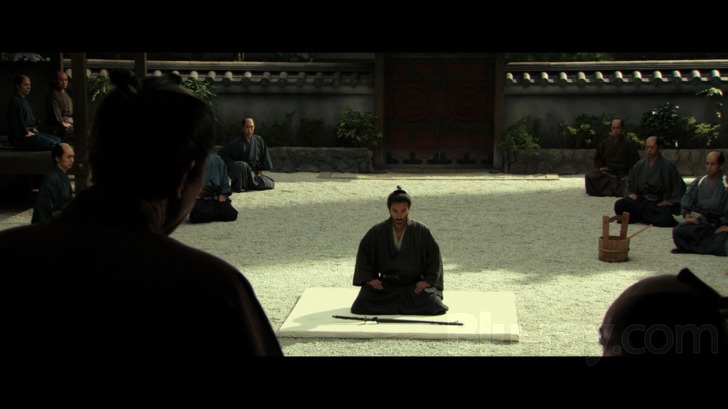
Hara-Kiri: Death of a Samurai is a remake of the highly acclaimed 1962 film Harakiri which Criterion released on Blu-ray a little over a year ago. Some might question Miike’s “need” to remake that film, and in fact the two are rather similar in tone and content, with one of the few salient differences being Miike’s decision to film in color as well as to more graphically depict some of the (rather occasional) violence. Those who are only used to Miike’s more hyperkinetic side might initially be thrown for a loop by Hara-Kiri: Death of a Samurai, for it is a rather lugubrious experience, one that takes its time developing a long festering story of revenge as well as revealing some not totally unexpected interrelationships between various characters. But here again Miike’s mastery is evident, for the film more than adequately reveals that Miike doesn’t require over the top action and violence to craft a compelling film experience.
The film is constructed largely out of two flashbacks, one (the first) relatively brief, and the second a more elaborate and telling reminiscence that puts several of the main characters into context and helps inform where “current” (meaning mid to late 17th century) events have left them. The film begins with a “penniless ronin” named Hanshiro Tsugomo (Ichikawa Ebizo) shows up at the palatial grounds of a samurai clan headed by Saito (Koji Yakusho), asking for permission to commit seppuku (“ritual suicide”) in the courtyard of the compound, since dying at such an honored place will supposedly confer some long sought after dignity on Tsugomo in the afterlife. Saito then launches into the first flashback of the film, relaying the story of the last “penniless ronin” to show up on his doorstep and request the same thing. It turns out that that man, Motome Chijiwa (Eito), was not in fact a real ronin but was a beggar of sorts who was attempting to pull a scam, hoping that the threat of suicide would engender sympathy and garner him either a few bucks or a job. This was evidently a common gambit back in the day, but Saito and his clan don’t fall for it, and in fact insist that Chijiwa commit seppuku, something that turns into a horrifyingly prolonged trial when it’s revealed that Chijiwa’s “sword” is a toy of sorts, made of bamboo.
Saito then asks Tsugomo if he’s just another “scam artist”, but it soon becomes apparent that Tsugomo is deadly serious, though he has his own story to tell, which sets the film out on its second, longer flashback. It probably won’t come as much of a surprise to anyone to discover that Tsugomo has a longstanding relationship with Chijiwa, which is outlined in a sober reflection of the tribulations that faced the Japanese people who were subsumed in a system over which they had little if any control. In fact Miike is here presenting the “flip side” of the samurai mythos that is presented in a more overtly heroic fashion by such legendary filmmakers as Akira Kurosawa.
It’s interesting and perhaps even instructive that Miike chose a noted Kabuki actor, Ichikawa Ebizo, to play the main character in the film, for there’s a certain ritualistic aspect to Hara-Kiri: Death of a Samurai, where a sort of clockwork fatalism plays out which ensnares most of the major characters in the film. Hara-Kiri: Death of a Samurai is a rather quiet film, especially by Miike standards, which occasionally explodes into horrific violence. Anchoring the film through these tonal shifts is Ebizo’s stalwart portrayal of a man confronting debilitating tragedies but seeking his own brand of personal justice within a system that elevated rote obedience over individual initiative.
Hara-Kiri: Death of a Samurai Blu-ray Movie, Video Quality 
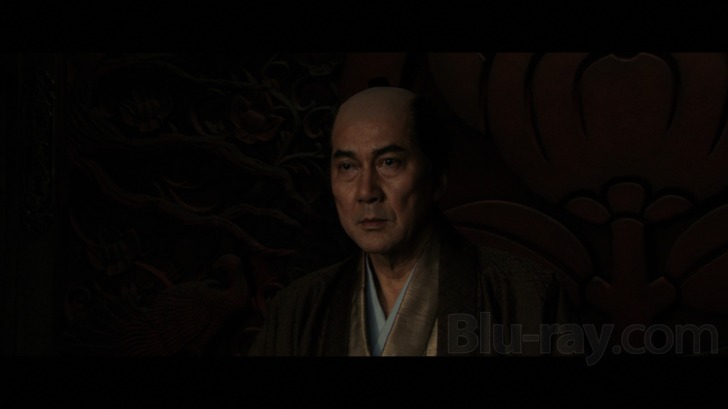
Hara-Kiri: Death of a Samurai is presented on Blu-ray courtesy of American Express (see my comments in the
supplements section), Tribeca Film and New Video with an AVC encoded 1080p transfer in 2.39:1. It's a little strange that
Miike first chose to film this in color and then also chose to pursue a deliberately tamped down palette that emphasizes
browns and blacks, with only occasional splashes of bright color to alleviate the general visual tedium. The film is also
incredibly dark a lot of the time, as can clearly be seen in the screenshots accompanying this review. But all of that
said, this high definition presentation is largely without flaw, with a beautifully natural film like appearance, excellent fine
detail (even in midrange shots) and generally excellent contrast and black levels. There are some niggling issues with
shadow detail which are probably endemic to the source elements.
It's worth noting that this film was released theatrically in a 3D version, while the Blu-ray offers only a 2D version. The 3D
choice might seem odd, for there really isn't much obvious exploitation of depth of field or even "gimmicks" in Miike's
framings, which leads me to believe the 3D presentation must have been relatively restrained, much like the film itself.
Hara-Kiri: Death of a Samurai Blu-ray Movie, Audio Quality 
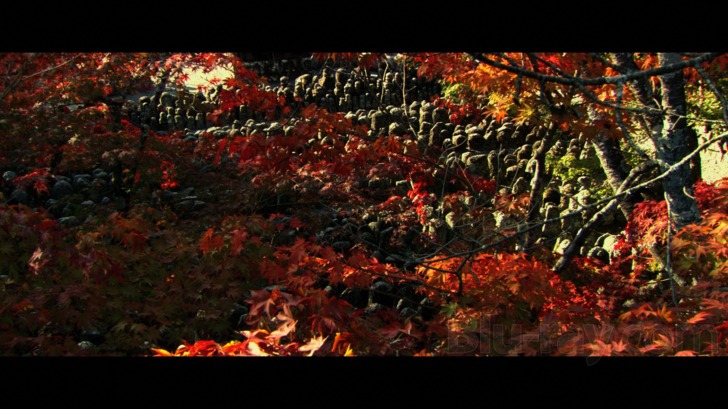
Hara-Kiri: Death of a Samurai features lossless DTS-HD Master Audio in both 5.1 and 2.0 formats. Both of these tracks offer superior fidelity, but perhaps surprisingly the often evocative ambient environmental sound effects are somewhat more present in the 2.0 mix, where they're focused equally across the soundstage, while in the 5.1 mix they tend to be at least slightly more diffuse. That said, the 5.1 track does offer some very appealing surround activity, and not necessarily in the big action set pieces. Some of the most effective immersion is in the quieter moments, when such activity as the breeze rippling through the leaves or the sound of a sudden rainstorm creates a very vivid sonic experience. Dialogue is always cleanly presented in both of these tracks, and dynamic range, while not extremely wide, does feature some occasional bursts of sonic activity that provide some variety.
Hara-Kiri: Death of a Samurai Blu-ray Movie, Special Features and Extras 
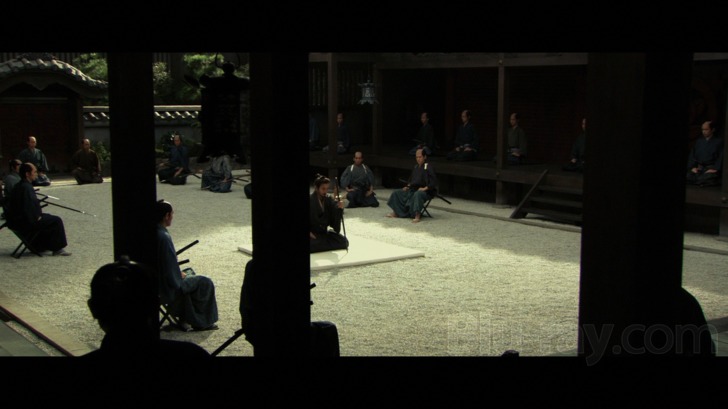
- Geoffrey Gilmore from Tribeca Film Discusses Hara-Kiri (1080i; 1:47) is a brief but interesting piece where Gilmore mentions some of the salient differences between Miike's film and the 1962 original. The full title of this featurette includes yet another plug for American Express, a corporate sponsor which is emblazoned across this Blu-ray in both packaging and the feature itself like there's no tomorrow. Maybe one of the so-called "privileges of membership" could be a respite from this ubiquitous corporate branding.
Hara-Kiri: Death of a Samurai Blu-ray Movie, Overall Score and Recommendation 
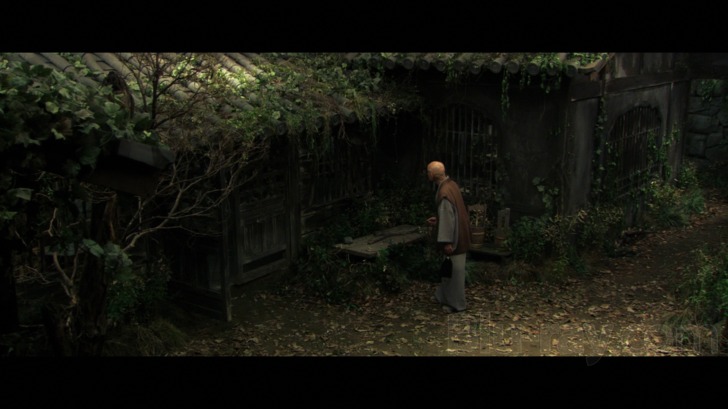
Longtime fans of Miike may not initially know exactly what to make of Hara-Kiri: Death of a Samurai, for it is a rather restrained exercise (at least by typical Miike standards) that takes its time and requires the viewer to just kind of relax and surrender to the film's slow but steady development of characters and ideas. This isn't to say that there is a complete lack of gruesome material, for there are at least two unbelievably disturbing sequences in the film that are much more in tune with some of Miike's more violent precursors. But Hara-Kari: Death of a Samurai doesn't rely on that kind of material for its power, and that is in fact one of the film's central accomplishments. Purists may well want to stick with the original 1962 version, but this remake has its own cogent points to make and at the very least makes an extremely commendable companion piece to the Kobayashi classic. This Blu-ray offers beautiful (if often quite dark) video and excellent video, and even without much in the way of supplementary material, comes Highly recommended.
Similar titles
Similar titles you might also like

Beanpole
Дылда / Dylda
2019

Harakiri
切腹 / Seppuku
1962

Birds of Passage
Pájaros de verano
2018

Bullhead
Rundskop
2011

Sansho the Bailiff
山椒大夫 / Sanshô dayû
1954

Ran
StudioCanal Collection
1985

Throne of Blood
蜘蛛巣城 / Kumonosu-jô
1957

Les Enfants Terribles
1950

An Actor's Revenge
雪之丞変化 / Yukinojô henge
1963

The Fool
Дурак / Durak
2014

Outrage
アウトレイジ / Way of the Yakuza
2010

The Life of Oharu
西鶴一代女 / Saikaku ichidai onna
1952

Day of Wrath
Vredens dag
1943

Running Out of Time
暗戰 / Am zin
1999

Kagemusha
影武者
1980

Freeze Me
フリーズ・ミー / Slipcover in Original Pressing
2000

Bastards
Les Salauds / Slipcover in Original Pressing
2013

Pieta
피에타
2012

A Touch of Sin
天注定 / Tian zhu ding
2013

The Painted Bird
Nabarvené ptáce / Slipcover in Original Pressing
2019